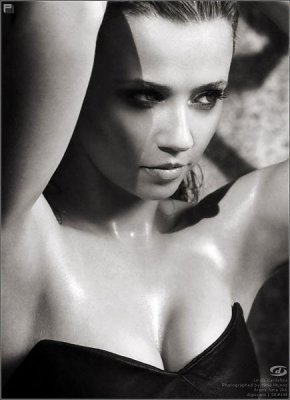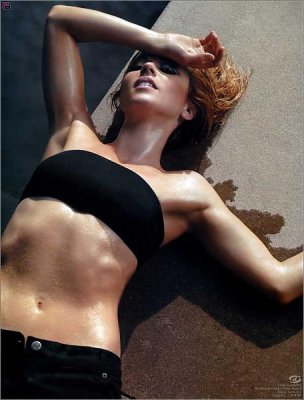AVCLUB.com;
Linda Cardellini
by Marc Hawthorne
January 18th, 2008
For a TV show that limped through a single season eight years ago, Freaks And Geeks certainly has a lot of rabid followers. A semiautobiographical series created and co-written by Paul Feig and produced by Judd Apatow (who has since gone on to massive success with films like The 40-Year-Old Virgin, Knocked Up, and Superbad), Freaks And Geeks was set in early-'80s Michigan and did a poignant and often hilarious job of showing what life is like for those on the fringes of high-school society. Main freak Lindsay Weir was played by Linda Cardellini, who nailed the part of a girl conflicted over the process of shedding her old skin; it sounds a bit like My So-Called Life, but holds up much better. With a Freaks And Geeks reunion taking place at San Francisco's Sketchfest on Jan. 20, The A.V. Club spoke with Cardellini—now playing nurse Samantha Taggart on ER—about what it was like being pelted with insults at the Macy's Thanksgiving Day Parade, and why Freaks And Geeks was so great.
The A.V. Club: How did you get involved with Freaks And Geeks?
Linda Cardellini: I auditioned. Nobody really knew who I was, and they said, "She's not sure if she wants to see you." I remember thinking, "If nothing else, I just want to prove to this casting director"—who I'd never met before—"that I can at least act." It was great, because that was really my only goal, and I think that took the pressure off of wondering what they wanted for the role, or what I was going to do. They had us audition for different parts, and they had us improv—as an actor, it was a grueling but fun process, because you actually got to do something really creative in there.
AVC: When you were reading the script, did you notice similarities between Lindsay and Claire Danes' character in My So-Called Life?
LC: No, I didn't. I didn't know of it. I'd heard about it and I'd heard the comparison, but I never had seen the show.
AVC: What initially attracted you to Freaks And Geeks?
LC: I had been reading a lot of scripts, and it was the best script that I had read. There were a few other shows that I was strongly in the running for, and I said, "I really want to do this show. I don't care if the other shows have better deals, or if they have a greater shot of being successful. This show is so good." It had so much humor and so much heart, and was so much more genuine to my experience in school, or my experience as an adolescent, compared to the other shows that I was reading. They all seemed to have a gimmick, whereas there really wasn't a gimmick necessarily with this show, other than it was trying to be as true to how awkward it feels to be that age as possible. It resonated with me. The thing that really drew me to it was, here was this person who was sort of disenchanted and uncomfortable in her adolescence, but she truly loved her parents. There were other scripts, and there were other kids who were sort of indifferent to the world around them, but she really had love for her brother and her parents, but she didn't know how to handle it. It was a character that was really struggling in a way that was very human—it was about her trying to cut the apron strings, and how difficult that is.
AVC: Did you have a similar relationship with your family?
LC: Yes, I'm very close to my family. And being that close to your family, I think you also struggle with how to become your own person.
AVC: You weren't too far out of high school when you made Freaks And Geeks—how much of your personal experience did you bring to Lindsay?
LC: Well, I was one of the older ones. James [Franco] and I were the older of the group, as opposed to Seth [Rogen], who was still 17 and going to school on-set. It really wasn't that hard for me—it's about her feeling comfortable in her own skin, and that's something that you struggle with in the type of business that we're in, [which] sometimes feels like a giant high school. [Laughs.] Some things were nostalgic, but other things were just playing on feeling like you're the outsider, or feeling like you're in that in-between phase. That awkwardness is not so unfamiliar to me.
AVC: Did you feel like it was something special when you were actually filming?
LC: Yes, definitely I thought we were making something special. That didn't necessarily mean I thought it was going to be successful. [Laughs.] I was still pretty green at that point, so I didn't really know. I look back on that as a really special time in my life. We had such a great group together, and we enjoyed each other so much, and we all truly loved what we were doing. We were able to really play, we had a lot of freedom, and yet we had writers who were so talented, and we were sort of thrust into this world in the 1980s. People were calling it a period piece, yet it was only in 1980. We were constantly learning things and having a really good time. We spent a lot of time together, on- and off-set.
AVC: When it comes to American comedies, it seems like making something great goes hand-in-hand with fearing that you're going to be cancelled. When did you get the sense that the show wasn't going to make it?
LC: [Laughs.] Well, we always sort of talked about it, and it always sort of had been a joke. I remember going to the upfront, and we were sitting with The West Wing and another new show that NBC had on, and we really felt like the freaks and geeks of the bunch—a bunch of kids sitting around in this room full of successful people. One of my funniest memories about the show and its obscurity was, John Daley and I were sent, and I think maybe Samm Levine, to do the Macy's Thanksgiving Day Parade. We were up on top of some kind of float and we were waving to people. We were so excited—I had never seen a crowd like that before in my life, and to be on a float coming down the street in New York on Thanksgiving Day in that parade was crazy. It was freezing and it was raining on us, and people were yelling out terrible things, cursing at us, and it was finally dead quiet for a split second, and one person yelled out, "Who are you?!" We just looked at each other and started laughing, and John Daley, who was 13 or 14 at the time, said, "I'm John Daley! This is Linda Cardellini! We're on a show called Freaks And Geeks! You should watch it, it's really good!" It made me laugh so hard. We had a great time all day, but nobody knew who we were or what our show was about. Thank God for the DVD, because some people would have never seen it.
The real time I knew when it was dying was when we had no food at craft services. [Laughs.] When we first started, we had a buffet—when you're young and you're struggling in Hollywood, a table full of free food is a godsend. Toward the end of it, we jokingly took a picture with a Polaroid that said, "Come to craft services and have a bite," with A underlined—they had taken away so much of the funding that we really didn't even have that much food to eat.
AVC: Did that put a cloud over the show while you were making it, or did you ignore the business side of things and just get down to work?
LC: There was definitely a sadness thinking that we weren't going to be able to continue what we'd been doing, because we loved it so much. But for me, there was sort of the feeling of, "Well, sometimes bright lights burn fast, and you really can't count on anything lasting too long." Which is funny, because then I went from doing that show on NBC to a show that's been on for 14 years. [Laughs.] It's anybody's guess, really.
AVC: Do you have a favorite episode?
LC: That's hard. The last episode is maybe my favorite. We knew that there was a 95 percent chance that the show was going to be canceled, so we shot that last episode—the last airing episode—two before we actually finished shooting. We shot it out of sequence so that would always be—which was so brilliant of Paul and Judd—the last episode of the show. It's funny, because people always ask me, "What ends up happening to Lindsay after the Dead?" But that's how they wanted to end the show, sort of in that ambiguous way. That episode, I think we all knew what we had was special and there was a chance that it wasn't going to happen, and we were ending it before anybody truly told us it was over. I've only seen parts of the show in recent years. That show seems to be about her saying goodbye, in some small way, to that version of her life. One of my favorite moments to act in that show was when she's getting on the bus and she stops to say goodbye to her mom—it's that minute of, "After I leave on this bus, things will never be the same." That's sort of an interesting time in your adolescence, where you choose to grow in your own way. I think the same thing with her and the Nick character was, she knew that something was ending—it had already ended, and there was something bittersweet about it.
AVC: Why do you personally think that a show that was canceled so early on still has such a rabid following?
LC: I really believe that it was just a very special combination of a lot of different people's hard work, if that makes any sense.
AVC: Probably the same reason why you were attracted to it in the first place—the realism.
LC: Yeah, it just seems true. I felt very lucky to be part of that, and I still feel very lucky. I am so grateful that people are still finding it, because I think it's got so much heart and it says so many things about so many of the overlooked people that go through high school. The geeks aren't the smartest kids in school—they're not those geeks—and the freaks aren't the worst kids. It's about the people in between, and how you feel when you're in that in-between phase.
AVC: A lot of your Freaks And Geeks castmates have continued working with Judd Apatow, but you haven't. Is there a reason why?
LC: No, I've seen Judd a bunch of times. I just ended up working—I work on ER a lot, and I think it just sort of hasn't happened. But there's no hidden reason.
AVC: With the writers' strike, obviously nothing is happening with ER right now. What else are you working on?
LC: [Laughs.] Pretty much not a lot right now. I've just been working on myself, I guess. This is the first time in a long time that I haven't been working. I don't think I've had more than a month off in years. So it's interesting.
AVC: Have you been taking advantage of that?
LC: I just got back from Switzerland, which I've never been to. I went to Switzerland and Amsterdam. Some friends of mine were playing music in Switzerland, so I went up to some small mountain town and had New Year's up there.



